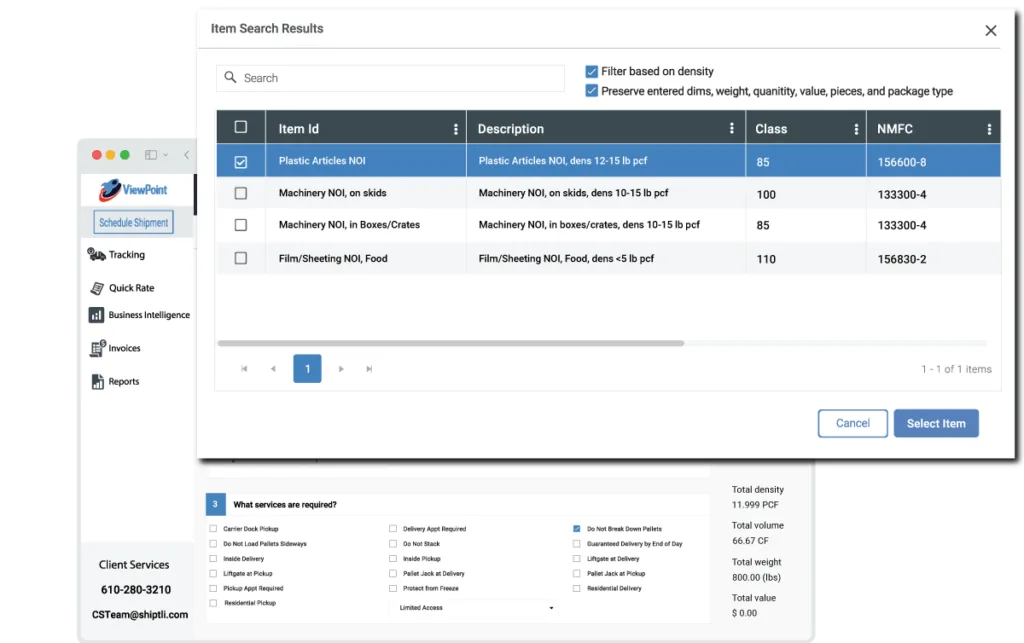Big NMFC® Code Changes are here – are you ready?
Docket-1’s NMFC (NMFC is a registered trademark of the National Motor Freight Traffic Association) Code Changes changes are in effect, while Docket-2 has just been announced by the NMFTA.
Be Ready with Freight Experts by Your Side
Docket 2025-2 is Announced
The first docket took effect on July 19, 2025. The second docket has now been released. A public feedback session will take place on September 29, 2025. Officials will announce final changes on November 6, 2025. The updates will publish on December 6, 2025. Shippers and businesses should join these sessions to stay informed and share input.
YouTube Series on NMFC Code Changes
Navigating NMFC code changes can be challenging, but staying informed is crucial to avoiding unexpected freight classification issues, cost adjustments, and compliance risks. Our exclusive YouTube series breaks down everything you need to know about the latest NMFC updates—straightforward, actionable, and designed for shippers and freight professionals like you.
The 2025 NMFC Code Changes
The National Motor Freight Traffic Association (NMFTA) is making changes to the National Motor Freight Classification (NMFC) codes, starting with Docket 2025-1. This update aims to simplify freight classification, especially for shipments that don’t have special handling, stowability, or liability concerns. The new system assigns these items to a 13-subclass density scale, and marks items with unique requirements using special symbols. The goal is to make Less-than-Truckload (LTL) classification more user-friendly, helping shippers, carriers, and third-party logistics providers (3PLs) choose the correct class on the first try and reduce disputes.
The Freight Classification Development Council (FCDC) is leading these updates. The first docket took effect on July 19, 2025. The second docket has now been released. A public feedback session will take place on September 29, 2025. Officials will announce final changes on November 6, 2025. The updates will publish on December 6, 2025. Shippers and businesses should join these sessions to stay informed and share input.
Four key factors influence NMFC classification: density, handling, stowability, and liability.
- Density: amount of space the shipment takes up
- Stowability: how easy it is to store the product during transit
- Handling: how easy it is to move the product
- Liability: the risk of damage and theft for moving the product
By shifting to a more standardized density-based system, NMFTA aims to make freight classification clearer, reduce confusion, and improve efficiency for everyone involved in logistics.
How a Transportation Management System Helps with NMFC Codes
ViewPoint makes it easy to manage your product IDs and NMFC codes in one place. It goes beyond basic storage by filtering NMFC codes by subclass based on density. As you enter shipment details, ViewPoint automatically calculates density, ensuring accurate classification every time.

Managing NMFC Codes in your TMS System
Keep your IDs and products updated to stay compliant with NMFC code changes. With the final updates going live on July 19, it’s important to update your system in advance to the deadline.
At TLI, we handle the heavy lifting to keep your NMFC codes current. Our team proactively updates NMFC classifications as soon as they’re released, ensuring shippers stay on track without disruptions. With 30 years of experience, we’re ready to update your system and keep your freight moving smoothly.
Managing NMFCs with Freight Invoice Audit
A freight audit helps shippers stay compliant with NMFC code changes by identifying misclassifications and billing errors before they become major issues. A freight audit reviews invoices and shipment data to ensure correct NMFC codes, preventing overcharges and disputes. As updates roll out, a thorough audit process keeps your classifications accurate and your costs in check. With NMFC codes changing, a freight audit is a smart way to protect your bottom line and streamline operations.
reweighs & Reclasses
If the carrier finds incorrect weight or class information, they may charge the shipper for inspections and add extra costs. TLI experts flag shipments with reweighs or reclassification to help mitigate costs.
Accessorial audit
An accessorial charge may have been added to the shipment, even if it wasn’t necessary. Rather than paying extra for an unused service, TLI experts investigate whether the service was essential and dispute if needed.
PRocesses audit
If discrepancies persist, delve deeper into their root causes to identify and implement solutions. TLI’s systems play a key role in streamlining processes, ensuring accurate information is processed upfront to prevent back-end challenges.
Acknowledgment of NMFTA’s Trademark
Whenever our educational content refers to the National Motor Freight Classification, we want readers to understand that the term NMFC is a registered trademark of the National Motor Freight Traffic Association (NMFTA). Our goal is to provide helpful industry education while also respecting the intellectual property rights of the NMFTA. Whenever we discuss topics related to freight classification, density, or commodity groupings, we recognize that NMFC identifies the official classification standard maintained and licensed by the NMFTA.
NMFTA is the owner of the National Motor Freight Classification®, more commonly known as the NMFC® (“NMFC”).